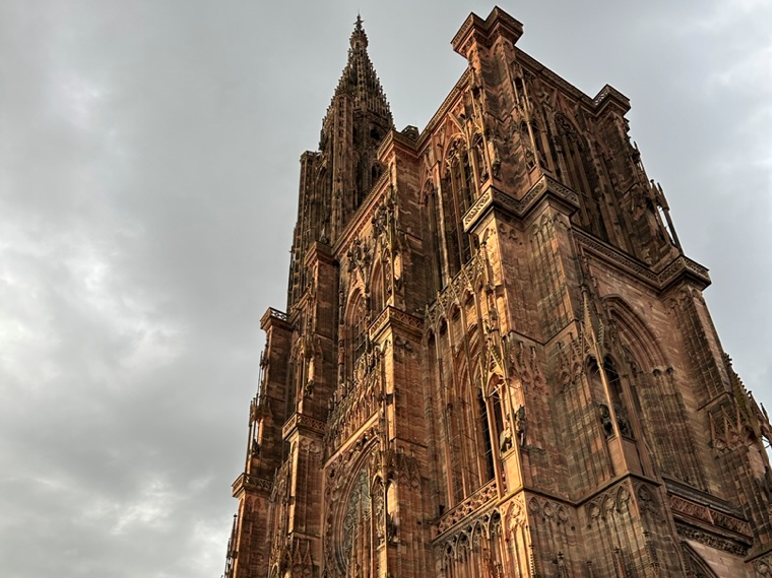By Hannah Waters
Bonjour! My name is Hannah, and I am a rising 2L. This summer, I had the incredible
opportunity to work at the European Centre for Law and Justice (ECLJ) in Strasbourg, France.
The ECLJ is a non-governmental organization dedicated to protecting human rights across the
globe. Although the ECLJ stands in defense of all human rights, it specifically advocates for
religious liberty and the right to life in Europe. With its office located only a short walk from the
European Court of Human Rights, the Council of Europe, and the European Parliament, the
ECLJ is uniquely situated to engage in front-line advocacy before some of the world’s most
influential international institutions.

In a world increasingly hostile to Christians, the ECLJ stands as a stalwart defender of those who
are targeted for their faith in Jesus Christ. During my time in Strasbourg, I had the opportunity to
come alongside the ECLJ and draw attention to the plight of persecuted Christians in the South
Caucasus and Nicaragua.
Most of my time at the ECLJ was spent composing a report on the intentional destruction of
Christian heritage in Nagorno-Karabakh, a region in the South Caucasus. This region, which was
a haven for the early Church, hosts a rich treasure trove of ancient churches, monasteries,
cemeteries, and artifacts that tells of a resilient people’s faith and culture. These cherished pieces
of Armenian history, however, are being systematically destroyed by Azerbaijan—a neighboring
country hostile to the Armenian people and their Christian faith. The Armenian Christians have
been displaced from the region, and they are forced to watch their heritage disappear. The nearly
forty-page report sought to detail the cultural sites that have been destroyed or damaged since
September 2023, evaluate the international response, and provide recommendations to prevent
total cultural erasure in Nagorno-Karabakh.

To circulate my findings, I drafted petitions, press releases, and articles, and I voiced the English
translation of the ECLJ’s video introduction of the report. I also wrote and helped translate
numerous letters to members of the Parliamentary Assembly of the Council of Europe. As a
result of the report and the ECLJ’s advocacy, the destruction in Nagorno-Karabakh was a topic
of discussion at a Parliamentary Assembly hearing focused on the use of cultural genocide as a
weapon of war.

I also authored a report (which will be published in the coming months) on the egregious
persecution of Christians in Nicaragua. As one of the ECLJ’s few American interns, I was asked
to write from the perspective of the U.S. and ask: Why should the U.S. fight for religious liberty
in Nicaragua? This report afforded a unique opportunity to advocate for international religious
freedom using faith-based and pragmatic policy arguments.
Additionally, I also helped translate numerous reports, articles, petitions, YouTube scripts, and
emails from French to English. This may have been my favorite part of the internship, for I loved
the back-and-forth dialogue with my French-speaking colleagues as we worked together—over
our own language barrier—to discover just the right way to convey our thoughts in each other’s
native languages. It was a unique opportunity to help expand the ECLJ’s impact by aiding the
organization in effectively reaching their English-speaking audience.

There were of course, abundant opportunities to explore Europe outside of work hours. My
fellow Regent Law intern, Alyssa Schiefer, and I took advantage of every spare moment we
could, exploring Strasbourg and Paris, hopping across the border to Germany, traveling to
Switzerland, and popping up to Luxembourg. As someone who had never traveled overseas, I
relished the opportunity to explore the countries I had only read about.
In all, the internship at the ECLJ was an unforgettable experience. It was not impactful simply
because of the exciting opportunities to visit famous international institutions, record in a film
studio, or explore Western European cities. It was unforgettable because even though I was
immersed in a different culture, I was still surrounded by brothers and sisters in Christ who had
dedicated their lives to giving a voice to the voiceless. This internship has encouraged me to
keep fighting for human rights, and it has only strengthened my conviction that Christians
can—and must—reach across cultures to unite in our common purpose to seek justice and love
mercy.
This post was written by a student at Regent University School of Law. The views expressed in this post do not necessarily reflect those of Regent University, Regent Law School, or the Center for Global Justice.

